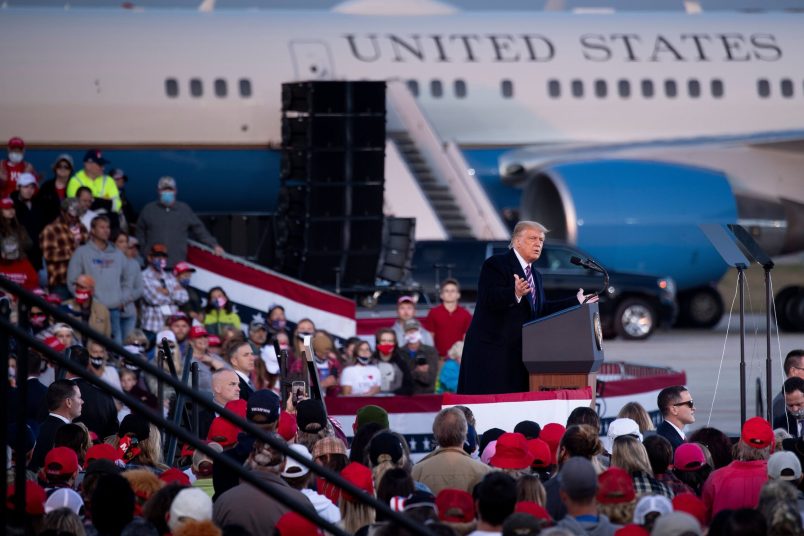As efforts to use the Disqualification Clause to keep Donald Trump off the ballot in 2024 pick up around the country, the man himself has put forth his first detailed rebuttal of the plan.
In a little-noticed petition filed Friday in the Minnesota Supreme Court, Trump laid out why he believes that the Constitution’s Disqualification Clause does not apply to him, and rehashed his view of why the facts don’t support a conclusion that he urged violence on Jan. 6.
On a surface level, Trump dismissed his utterances on the day of the Capitol breach itself as calls for “peaceful conduct” and “advocacy,” but he was forced to go deeper and grapple with the constitutional text as he tries to skirt the ban on those who engaged in insurrection from holding office. It was a revealing needle-threading exercise, forcing the former president to distinguish his conduct and what happened on Jan. 6 from “insurrection.” Trump also found himself in the awkward position of arguing that he didn’t engage in an insurrection while maintaining that he didn’t lose the election.
Let’s assess Trump’s balancing act.
The former President argued for a broader definition of “insurrection,” saying that it should be defined as “treasonous warmaking.” Trump also launched a more brazen argument that the Disqualification Clause requires “assistance to a foreign power” for it to be applicable.
The question of what constitutes an “insurrection” remains both alive and somewhat unclear. Free Speech for People, the non-profit which brought the Minnesota suit, spent the first two years after Trump left office suing to block various far-right members of Congress who supported the former president’s attempt to reverse his loss from appearing on the ballot in the 2022 midterms by invoking the Disqualification Clause.
Those efforts failed, but did succeed in generating court rulings which upheld Reconstruction Era-decisions that defined insurrection. At the same time, more than 150 years have passed since the Constitution’s ban on candidates who engaged in an insurrection has been litigated, leaving the question not entirely settled.
What’s less open is whether the Disqualification Clause only applies to engagement with foreign powers.
That argument led Trump into an odd place in the filing, where he asserted that merely advocating for a potential “future rebellion” did not cross the line.
“By the same token, subtle or implicit advocacy for a future riot at (or even attack on) the Capitol could not qualify under Section Three, even if President Trump had in fact engaged in such advocacy,” the filing reads.
Minnesota law mandates that challenges to federal candidates start in the state’s Supreme Court, which allowed this case to bypass the often-lengthy district and appellate court phases. But last month, the court effectively ordered everyone involved to act as if a motion to dismiss had been filed, asking them to lay out arguments for whether the court was empowered to hear and rule on the effort to disqualify Trump.
The court also asked for factual disputes from Trump, and he spent much of his brief complaining that Free Speech for People characterized his efforts to reverse his loss as some sort of “attempt to overthrow or rebel against the United States government.”
Throughout that section of the brief, Trump steadily refuses to concede both that he lost the 2020 election, and that his actions amounted to anything more than peaceful disagreement.
It’s a return to the baseline argument which Trump has made since 2020, and which Special Counsel Jack Smith called out in his D.C. indictment and subsequent filings: that saying the election was fraudulent is a mere disagreement between two parties acting in good faith. Trump says in the filing that it’s against the country’s constitutional tradition to “treat the losers of those disputes as insurrectionists.”
That ignores the lengths to which Trump went – culminating in the violence of Jan. 6 – to reverse his loss.
But it remains to be seen how the Minnesota Supreme Court – and other tribunals around the country weighing requests to disqualify Trump – will react.







I have a question:
Can the state movements on getting Trump disqualified from the ballot use sworn testimony and depositions from the Jan6 committee in their court cases?
My counter would be that if the “losers” seek to correct that loss using the tools of insurrection, then the losers have graduated into becoming insurectionists.
If this was a peaceful disagreement, why was the evacuation of the Legislative branch necessary? They were there to perform their Constitutionally mandated role of certifying the election.
To answer my own question, it’s because the rioters were engaging in violence. Hundreds, if not thousands are in jail for this and they’ve all said that they were there because Trump told them that the election results were invalid. There is a pretty consistent line here which gets you to defining this as Trump’s insurrection.
Technically, this is not a criminal trial and there are no criminal penalties attached so 4th & 6th amendment protections of due process and rights to confront accusers should not apply… But that is up to the court… I am guessing they will revert to common law
Bounce Donnie off the ballot: he doesn’t need help with bouncing off the walls.